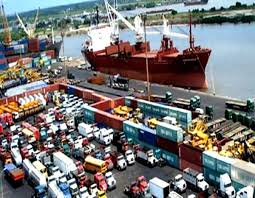A large number of empty shipping containers now sit idle at Nigeria’s busiest ports, exposing deep problems in the country’s non-oil export trade. Findings from source revealed that ports in Apapa and Tin Can Island, both in Lagos, are overwhelmed with unused containers, as exporters complain of delays, rising demurrage charges, and poor coordination among key players in the shipping and export process.
Exporters, especially those in agro-processing and local manufacturing, say the current situation is hurting their ability to move goods out of the country. Several traders said their goods have been trapped for months, while some containers have remained idle for over a year. This has led to growing fears that Nigeria’s non-oil foreign exchange earnings may suffer even more setbacks.
At the centre of the problem is the high cost of demurrage — a charge that shipping companies demand when containers stay too long at the port. Exporters say the longer the delay, the more they are billed, making it difficult for them to continue in business. In some cases, containers are seized or abandoned when exporters cannot meet the rising costs. Others are delayed by Nigerian Customs or terminal operators, who often claim that the containers still carry outstanding charges.
Nigeria’s non-oil exports — which include cocoa, sesame seeds, cashew, processed steel, ginger, and textiles — are meant to help the country earn foreign exchange and reduce dependence on crude oil. However, the current port crisis is frustrating efforts to grow this important part of the economy.
The Nigerian Ports Authority (NPA) has made some statements on the need to ease cargo movement and improve port efficiency. But traders insist that nothing has changed on the ground. They blame overlapping agencies, outdated clearance processes, and lack of digital tracking systems for the mess. Most exporters do not even know where their goods are or how much they owe at any given time due to lack of a centralised data system.
Mr Tunde Oladele, a cashew exporter in Ogun State, said his business lost over ₦15 million in the past six months because his goods were delayed at the Lagos Port Complex. “I paid for container hire, transportation, customs clearance, but the goods didn’t move. The buyer cancelled the contract. Now I’m left with debts,” he said.
Another trader, Mrs Chinyere Akunne, who exports processed ginger from Kaduna, said she has stopped exports completely. “It’s not worth it anymore. The delay, the losses, the stress — it’s killing small businesses,” she said.
Manufacturers are also affected. They need containers to move raw materials and finished goods. But with many containers stuck at ports, they now struggle to get enough units to meet production timelines. Some factories now run below capacity or face job cuts.
Industry experts say Nigeria must act fast. They recommend building more container terminals, modern cranes, and expanding berths at major ports. There is also a call for a full shift to electronic documentation and tracking of shipments. Others are asking for the establishment of a demurrage relief fund to help small and medium exporters who cannot afford long port delays.
Shipping experts like Captain Emmanuel Nwokedi believe Nigeria must create a proper export logistics council. “We need a single platform to track container movement, standardise charges, and hold shipping lines and regulators accountable,” he said.
With the African Continental Free Trade Area (AfCFTA) now in full swing, Nigerian exporters risk being left behind if port logistics do not improve. Proper export handling will not only boost foreign earnings but also support job creation, reduce inflation, and promote local industry growth.
Some traders and stakeholders have called on President Bola Ahmed Tinubu to personally intervene in the matter. They want the Minister of Marine and Blue Economy, Adegboyega Oyetola, and the Minister of Industry, Trade and Investment, Doris Uzoka-Anite, to organise an emergency stakeholder meeting that will involve exporters, port operators, customs officials, and shipping firms.
Without firm action, exporters warn that Nigeria’s non-oil trade may collapse under the weight of delays, cost pressures, and poor regulation. The idle containers now symbolise a growing trade emergency that threatens jobs, revenue, and investor confidence in Nigeria’s export economy.
